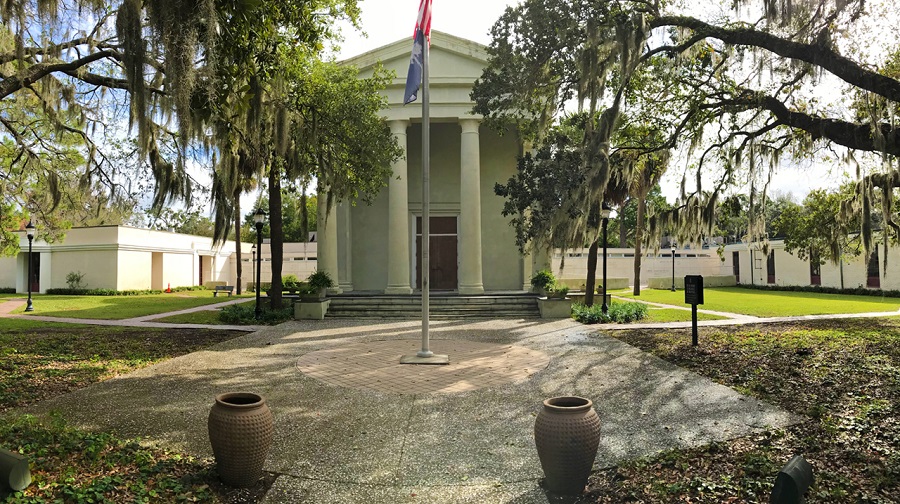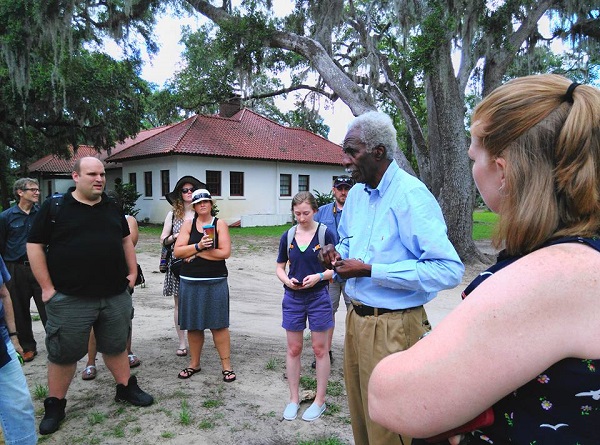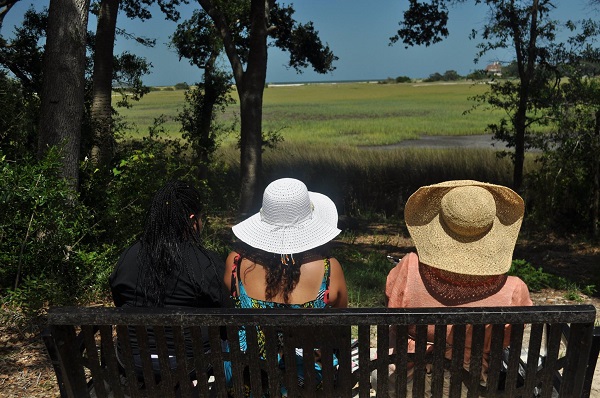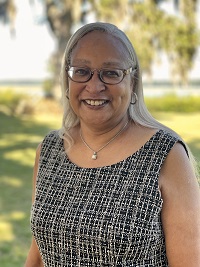America's Reconstruction: The Untold Story

At USC Beaufort’s summer institute for educators, South Carolina teachers visited
Camp Saxton, the site of an important Civil War battle and part of the Reconstruction
Era National Historical Park. Teachers from Grades 2 through 11 spent a week in June
learning about Beaufort’s role in the Reconstruction Era. During this week-long professional
workshop presented, historians Lawrence Rowland, Valinda Littlefield and Larry Watson
taught the group.
Samantha Mischke of the National Park Service guided the educators on field trips
to local historic sites. Participants developed lesson plans that they will share
with teachers across the state. The S.C. Council for African American Studies and
USCB’s Institute for the Study of the Reconstruction Era sponsored the summer institute.
The institute offers an in-depth look at the historical dimensions and significance of the Reconstruction in the Lowcountry and United States.
Educators from around the country participate in this workshop about one of the most neglected and misunderstood periods in our nation’s history, which was influenced by events and personalities originating from the Sea Islands of South Carolina.
We closely three broad themes over the course of the institute:
- Prelude to Reconstruction
- Reconstruction and its Aftermath
- Historical Memory and the “Second Reconstruction,” the modern Civil Rights Movement.
Each theme will include most significant issues, events, historical actors, and watershed
moments during Reconstruction.

The Reconstruction Era was literally a period of rebuilding—it entailed the reshaping of the ideologies of the defeated Old South and the physical re-construction of the region so desolated by the ravages of war, and, as a nation, developing policies that thoroughly remade and modernized America. The ending of slavery not only brought freedom to African Americans but also inaugurated a complex reshaping of fundamental American institutions including the lawmaking process, family structure, church organization, and the very definition of American citizenship itself.
The South Carolina Lowcountry played a pivotal role in this important period of U.S. history. On November 7, 1861 (long remembered by former slaves as the “day of the big gun-shoot”), just months after the fall of Fort Sumter, the Union Navy recaptured Port Royal, South Carolina. This prompted the panic and mass exodus of the region’s plantation owners, who left behind thousands of their enslaved people. This provided an opportunity for a dress rehearsal of sorts for Reconstruction known as the “Port Royal Experiment.” The experience there prepared participants and observers for the more widespread, future implementation of truly revolutionary changes in education policy, civil rights, and democracy, and importantly showed that these policies could succeed in longer-range plans for the reconstruction of the South once the war could be brought to an end.

Alternating between lecture, discussion, and hands-on experience, the institute will unfold in Beaufort, on St. Helena Island, Port Royal.
The institute will be structured around the following Activities:
- Well-developed weekly themes
- Self-managed institute reading circles that incorporates daily discussion
- Creation and maintenance of an Untold Story web-based database with links to national resources
- The development of lesson and teaching plans
- Investigation of archival resources
- Scholarly led sessions
- Field study trips to key regional sites.
A group of eminent historians will be assembled whose areas of expertise are specific to the three proposed themes. They will each work with teachers to explore key questions and go deeper with the content so that the goals of the institute can be sustained beyond the three week experience. A project advisor will work with the teachers throughout the institute to provide support and guidance for the assigned lesson plan projects. Teacher scholars will be expected to fully participate and fully adhere to the code of civility which will be placed in their institute packets and discussed during day one of the institute.
USCB and visiting faculty will provide engaging instruction.
Contact Us
Valinda W. Littlefield
Interim Director of the USCB Institute for the Study of the Reconstruction Era
Associate Professor, History
Beaufort, SC 29902
